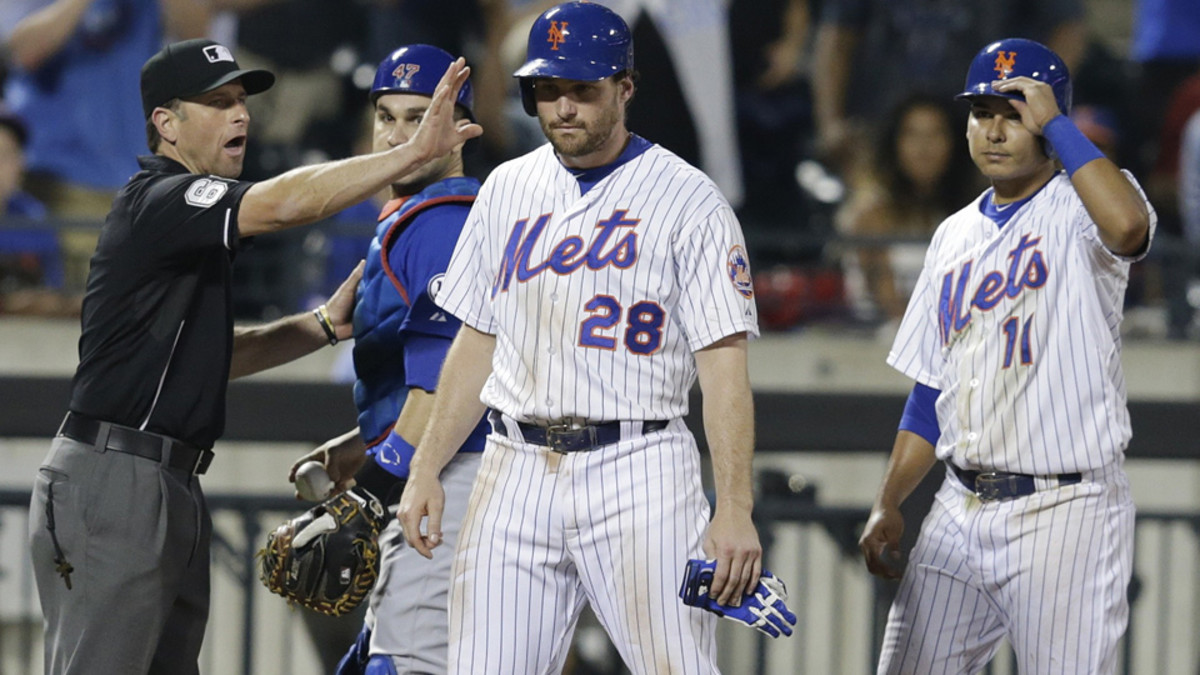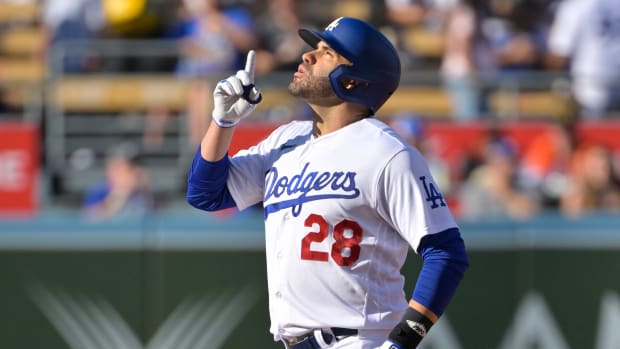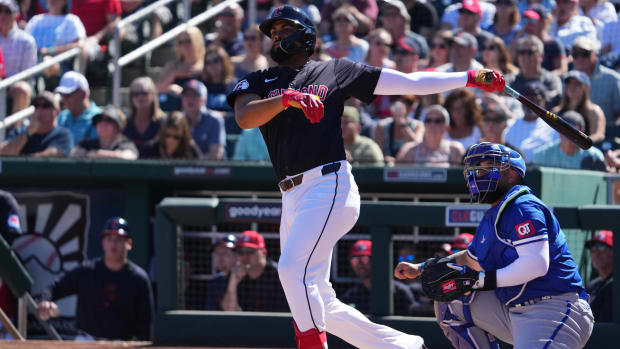Watch: Mets blunder on base paths in one of year's dumbest plays
On Wednesday night, the Mets unveiled one of the dumbest plays of the season, turning a suicide squeeze attempt into a comedy of errors on the base paths that ran the team right out of a scoring opportunity in a 2–0 loss in 11 innings to the Cubs.
Let's set the stage: The game was tied, 0–0, in the bottom of the eighth inning. The Mets had runners on second and third with one out after Ruben Tejada reached on an error by Starlin Castro and Daniel Murphy doubled. Rookie Darrell Ceciliani stood at the plate, pinch hitting for John Mayberry and facing Cubs reliever Pedro Strop. Ceciliani isn't a particularly good hitter—he's batting just .237 with 22 strikeouts in 59 at-bats with New York—and swung over the top of a Strop slider to begin the at-bat. So Mets manager Terry Collins decided to get a little wild and crazy, putting on a suicide squeeze.
The suicide squeeze, if done right, is a neat trick: The runner on third breaks for home on the pitch as the batter tries to drop down a bunt. If the bunt gets down, it's a sure run, as whoever's fielding likely won't have time to get the runner at home. If it goes wrong, however, the suicide squeeze ... well, it's right there in the name, isn't it?
Anyway, as Strop delivered his second pitch of the at-bat, Ceciliani squared around and Tejada took off. The result wasn't pretty.
Carlos Carrasco's near no-hitter latest in dominant Indians pitching
To recap: Ceciliani whiffed on the bunt, and with Tejada heading home on the pitch, the Cubs had him easily caught in a rundown. From second base, Murphy noticed that Tejada was a dead duck and went to third, making it easily. But Tejada, apparently unaware of his teammate's presence, ran right past him. Chicago catcher Miguel Montero, who had been chasing Tejada, alertly tagged Murphy, who was called out for inadvertently passing Tejada on the base paths. Montero then realized Tejada had gone past third and never returned to the bag, so he ran over and tagged him as well, finishing off one of the more mystifying and embarrassing double plays you'll see all season.
But strangely enough, third base umpire Chris Guccione overturned his own call, calling Murphy safe at third. Cubs manager Joe Maddon came out to protest, to no avail, and after a quick conference, Murphy was indeed ruled safe. Not that it ended up mattering for the Mets: Ceciliani struck out swinging four pitches later to end the inning. Later, crew chief Laz Diaz told a reporter that the decision to call Murphy safe was because "once [Tejada] passed the [third base] bag, he abandoned his efforts to be safe. Once that happened, it's Murphy's bag."
Buyers or sellers? Breaking down each AL team's trading outlook
After the game, Collins defended his call for the suicide squeeze, saying, "We're not getting a lot of opportunities. That's why you sit there and say, 'Let's open it up.' ... I figured with Ceciliani coming up there I’d give him a swing, then do something we haven’t done all year. We just didn’t execute it." Beyond the odd timing for a play the team has apparently never even attempted this season, the decision to have a rookie who struggles to make contact try to lay down a perfect bunt in a scoreless game with no room for error seems rife for second-guessing. Not that Collins deserves all the blame: Ceciliani's bunt attempt was woeful, and Tejada's abysmal base running deserves special attention.
As poorly executed and confusing as that suicide squeeze attempt was, however, it shouldn't take attention away from the fact that the Mets, in a late-game situation where they desperately needed a run, were reduced to batting a rookie with all of a month's worth of major league experience. A knee injury to Michael Cuddyer has left New York with a three-man bench—on Wednesday night, it was Ceciliani, infielder Eric Campbell and backup catcher Johnny Monell—and almost nothing in the way of viable pinch-hitting options. Campbell had already been burned in the seventh inning hitting for Bartolo Colon, and with Collins not wanting to go righty-versus-righty with Mayberry against Strop, his only choice was Ceciliani.
The thin bench and bad pinch-hitting options wouldn't be so exposed, meanwhile, if the Mets' starters were capable of scratching out any runs on their own. But Wednesday's shutout loss is the team's second straight, and on the year, New York is averaging a paltry 3.49 runs per game, 28th in all of baseball; the team's .232 batting average is better only than the Mariners (and by a point, at that). On the season, the Mets have been shut out nine times; only the Padres (13) have been blanked more often.
The Mets return to action on Thursday afternoon against the Cubs looking to avoid a three-game sweep. Hopefully, they can avoid another base-running blunder, too.



































